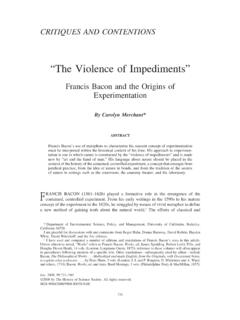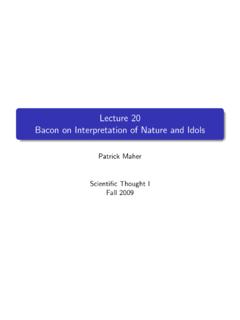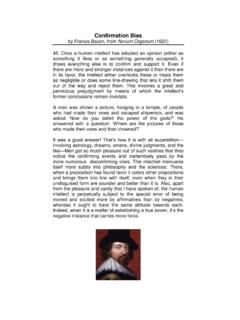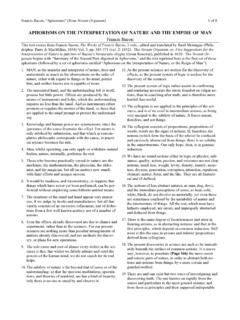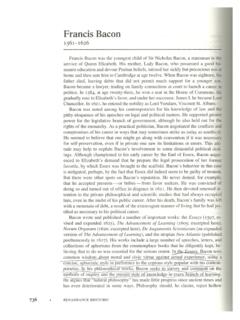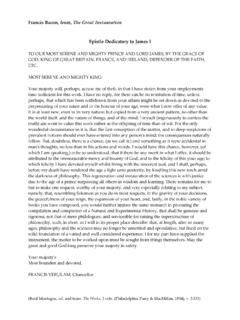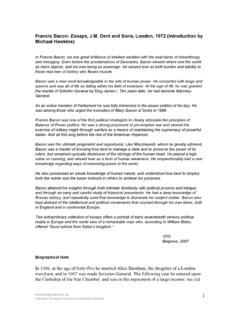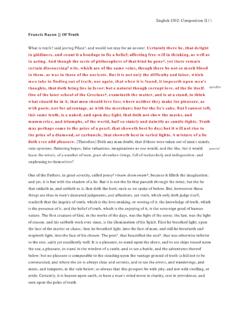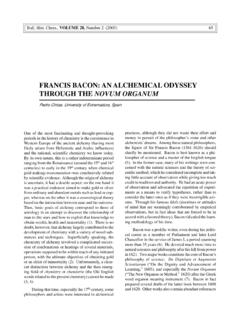Transcription of Francis Bacon biography
1 Francis Bacon biography Francis Bacon was born on January 22, 1561 in London, England. Bacon served as attorney general and Lord Chancellor of England, resigning amid charges of corruption. His more valuable work was philosophical. Bacon took up Aristotelian ideas, arguing for an empirical, inductive approach, known as the scientific method, which is the foundation of modern scientific inquiry. Early Life Statesman and philosopher Francis Bacon was born in London on January 22, 1561. His father, Sir Nicolas Bacon , was Lord Keeper of the Seal. His mother, Lady Anne Cooke Bacon , was his father's second wife and daughter to Sir Anthony Cooke, a humanist who was Edward VI's tutor. Francis Bacon s mother was also the sister-in-law of Lord Burghley.
2 The younger of Sir Nicholas and Lady Anne's two sons, Francis Bacon began attending Trinity College, Cambridge, in April 1573, when he was 11 years old. He completed his course of study at Trinity in December 1575. The following year, Bacon enrolled in a law program at Honourable Society of Gray's Inn, the school his brother Anthony attended. Finding the curriculum at Gray's Inn stale and old fashioned, Bacon later called his tutors "men of sharp wits, shut up in their cells if a few authors, chiefly Aristotle, their dictator." Bacon favored the new Renaissance humanism over Aristotelianism and scholasticism, the more traditional schools of thought in England at the time. A year after he enrolled at Gray's Inn, Bacon left school to work under Sir Amyas Paulet, British ambassador to France, during his mission in Paris.
3 Two and a half years later, he was forced to abandon the mission prematurely and return to England when his father died unexpectedly. His meager inheritance left him broke. Bacon turned to his uncle, Lord Burghley, for help in finding a well-paid post as a government official, but Bacon s uncle shot him down. Still just a teen, Francis Bacon was scrambling to find a means of earning a decent living. In March 1626, Bacon was performing a series of experiments with ice. While testing the effects of cold on the preservation and decay of meat, he stuffed a hen with snow near Highgate, England, and caught a chill. Ailing, Bacon stayed at Lord Arundel's home in London. The guest room where Bacon resided was cold and musty. He soon developed bronchitis.
4 On April 9, 1626, a week after he had arrived at Lord Arundel's estate, Francis Bacon died. In the years after Bacon 's death, his theories began to have a major influence on the evolving field of 17th-century European science. British scientists belonging to Robert Boyle's circle, also known as the "Invisible College," followed through on Bacon 's concept of a cooperative research institution, applying it toward their establishment of the Royal Society of London for Improving Natural Knowledge in 1662. The Royal Society utilized Bacon 's applied science approach and followed the steps of his reformed scientific method. Scientific institutions followed this model in kind. Bacon is still widely regarded as a major figure in scientific methodology and natural philosophy during the English Renaissance.
5 Having advocated an organized system of obtaining knowledge with a humanitarian goal in mind, he is largely credited with ushering in the new early modern era of human understanding. , , 0167-18711 This PDF book belongs to Sabuj Mondal Of Truth Francis Bacon (1564-1626) WHAT is truth? said jesting Pilate, and would not stay for an answer. Certainly there be that delight in giddiness, and count it a bondage to fix a belief; affecting 1 free-will in thinking, as well as in acting. And though the sects of philosophers, of that kind 2 be gone, yet there remain certain discoursing 3 wits which are of the same veins, though there be not so much blood in them as was in those of the ancients.
6 But it is not only the difficulty and labor which men take in finding out of truth, nor again that when it is found it imposeth upon 4 men s thoughts, that doth bring lies in favor; but a natural though corrupt love of the lie itself. One of the later school 5 of the Grecians examineth the matter and is at a stand to think what should be in it, that men should love lies, where neither they make for pleasure, as with poets, nor for advantage, as with the merchant; but for the lie s sake. But I cannot tell; this same truth is a naked and open day-light, that doth not show the masks and mummeries and triumphs of the world, half so stately and daintily as candle-lights. Truth may perhaps come to the price of a pearl, that showeth best by day; but it will not rise to the price of a diamond or carbuncle, that showeth best in varied lights.
7 A mixture of a lie doth ever add pleasure. Doth any man doubt, that if there were taken out of men s minds vain opinions, flattering hopes, false valuations, imaginations as one would, and the like, but it would leave the minds of a number of men poor shrunken things, full of melancholy and indisposition, and unpleasing to themselves? 1 One of the fathers, in great severity, called poesy vinum d monum [devils -wine], because it filleth the imagination; and yet it is but with the shadow of a lie. But it is not the lie that passeth through the mind, but the lie that sinketh in and settleth in it, that doth the hurt; such as we spake of before. But howsoever these things are thus in men s depraved judgments and affections, yet truth, which only doth judge itself, teacheth that the inquiry of truth, which is the love-making or wooing of it, the knowledge of truth, which is the presence of it, and the belief of truth, which is the enjoying of it, is the sovereign good of human nature.
8 The first creature of God, in the works of the days, was the light of the sense; the last was the light of reason; and his sabbath work ever since is the illumination of his Spirit. First he breathed light upon the face of the matter or chaos; then he breathed light into the face of man; and still he breatheth and inspireth light into the face of his chosen. The poet 6 that beautified the sect 7 that was otherwise inferior to the rest, saith yet excellently well: It is a pleasure to stand upon the shore and to see ships tossed upon the sea; a pleasure to stand in the window of a castle and to see a battle and the adventures thereof below: but no pleasure is comparable to the standing upon the vantage ground of truth (a hill not to be commanded, and where the air is always clear and serene), and to see the errors and wanderings and mists and tempests in the vale below; so always that this prospect be with pity, and not with swelling or pride.
9 Certainly, it is heaven upon earth, to have a man s mind move in charity, rest in providence, and turn upon the poles of truth. 2 To pass from theological and philosophical truth to the truth of civil business; it will be acknowledged even by those that practise it not, that clear and round dealing is the honor of man s nature; and that mixture of falsehood is like alloy in coin of gold and silver, which may make the metal work the better, but it embaseth it. For these winding and crooked courses are the goings of the serpent; which goeth basely upon the belly, and not upon the feet. There is no vice that doth so cover a man with shame as to be found false and perfidious. And therefore Montaigne saith prettily, when he inquired the reason why the word of the lie should be such a disgrace and such an odious charge.
10 Saith he, If it be well weighed, to say that a man lieth, is as much to say, as that he is brave towards God and a coward towards men. For a lie faces God, and shrinks from man. Surely the wickedness of falsehood and breach of faith cannot possibly be so highly expressed, as in that it shall be the last peal to call the judgments of God upon the generations of men; it being foretold that when Christ cometh, he shall not find faith upon the earth. Note 1. Loving. Note 2. The Skeptics. Note 3. Latin, windy and rambling. Note 4. Restricts. Note 5. Lucian. Note 6. Lucretius. Note 7. Epicureans. Of Marriage and Single Life Francis Bacon (1564-1626) HE that hath wife and children hath given hostages to fortune; for they are impediments to great enterprises, either of virtue or mischief.
